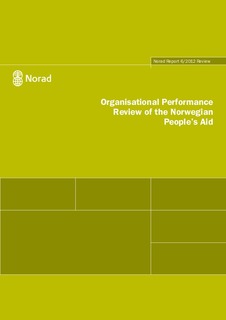Organisational Performance Review of the Norwegian People's Aid
Research report
Permanent lenke
http://hdl.handle.net/11250/2475078Utgivelsesdato
2012-08-01Metadata
Vis full innførselSamlinger
- Publications [1488]
Originalversjon
Oslo: Norad (Norad rapport: Gjennomgang no. 6/2012) 64 p.Sammendrag
The Norwegian People’s Aid (NPA) was established in 1939 as the trade unions’ voluntary health and solidarity organisation. NPA’s international work includes long-term development efforts and humanitarian work, including a substantial portfolio on land mine clearance. Norad’s support to NPA totals 150 million NOK in 2012, which makes NPA one of Norad’s largest grant recipients. NPA’s cooperation agreement with Norad covers 19 countries in Africa, Latin America, and Asia. NPA also has regional programmes in Southern Africa, Latin America and the Middle East and North Africa. Organisational performance reviews are part of Norad’s quality assurance of its cooperation with civil society organisations. Before entering a new multiyear agreement with NPA for 2012-2015, Norad therefore commissioned this review, which was carried out by Elling N. Tjønneland (CMI) and Gisle Hagen (Norad). NPA’s main strategy for its international work is to support popular organisations that work to influence government towards the fulfillment of democratic rights and a just distribution of power and resources in society. The purpose of this review was to look at how this takes effect in one selected country context, Rwanda, and to explore the results of NPA’s support. The review found that NPA’s programme for strengthening civil society in Rwanda was highly relevant and strategic, with great potential to make a big difference to the capacity of civil society organisations to engage in public policy dialogue. The programmatic approach applied in Rwanda, with targeted support for development of long term strategies and work plans to selected civil society actors at national and local level, was seen as one of the factors explaining the success of the program. However, the approach was also seen to entail an instrumental view of the partner, with NPA’s role primarily that of a regular donor. The dialogue wi
Utgiver
NoradSerie
Norad rapport: Gjennomgang 6/2012Norad rapport: Gjennomgang 6/2012
